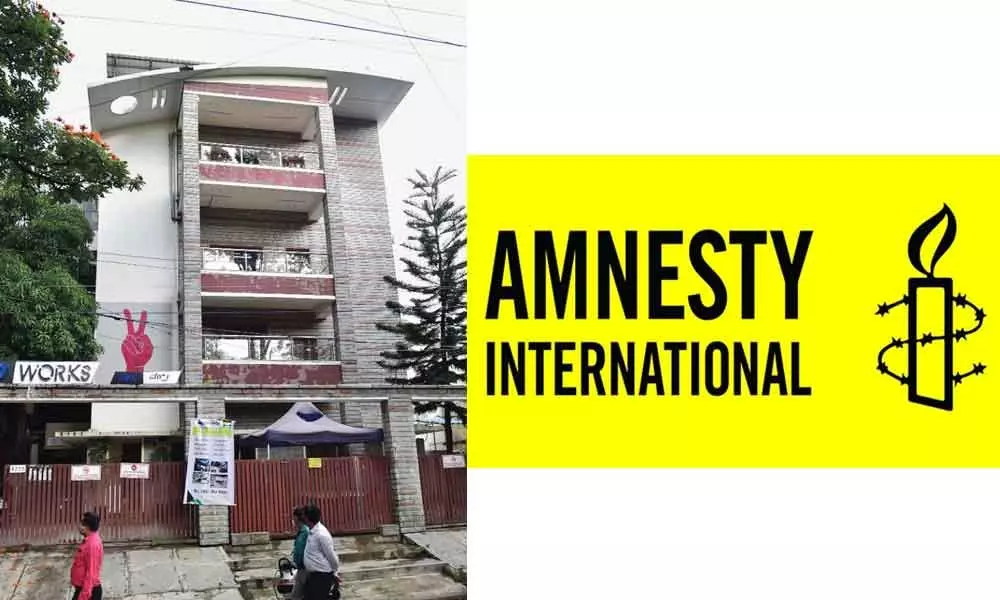Amnesty halts work in India, shuts down office in Bengaluru

Amnesty halts work in India, shuts down office in Bengaluru
Forced to lay off staff, suspend campaign due to govt witch-hunt
Bengaluru: Human rights watchdog Amnesty International on Tuesday said that its work in India has been halted after the government froze several of the organisation's bank accounts. Its offices in Bengaluru were raided by the Central Bureau of Investigation (CBI) in November last year in connection with accusations that the non-profit had received foreign funds in violation of the law.
Avinash Kumar, the executive director of Amnesty International India, has accused the government of indulging in a "witch-hunt of human rights organisations". Amnesty says its bank accounts have been frozen and it's been forced to lay off staff in the country and suspend all its campaign and research work.
In a statement posted on its website, Amnesty International said, "The complete freezing of Amnesty International India's bank accounts by the Government of India which it came to know on 10 September 2020, brings all the work being done by the organization to a grinding halt. The organisation has been compelled to let go of staff in India and pause all its ongoing campaign and research work."
In October 2018, the group's offices in Bengaluru were raided by the Enforcement Directorate, which investigates financial crimes. Its accounts were frozen then too, but Amnesty says it was able to access them after seeking a court's intervention.
In early 2019, the group says dozens of its small donors were sent letters by the country's income tax department. And later in the same year, Amnesty's offices were raided again, this time by the Central Bureau of Investigation, based on a case registered by India's home affairs ministry.
In a statement put out on its website, Avinash Kumar said, "Treating human rights organisations like criminal enterprises and dissenting individuals as criminals without any credible evidence is a deliberate attempt by the enforcement directorate and government of India to stoke a climate of fear and dismantle the critical voices in India."
"The continuing crackdown on Amnesty International India over the last two years and the complete freezing of bank accounts is not accidental.
The constant harassment by government agencies including the Enforcement Directorate is a result of our unequivocal calls for transparency in the government, more recently for accountability of the Delhi police and the Government of India regarding the grave human rights violations in Delhi riots and Jammu & Kashmir. For a movement that has done nothing but raise its voices against injustice, this latest attack is akin to freezing dissent," he stated.
Amnesty International India further stated that it stands in full compliance with all applicable Indian and international laws. For human rights work in India, it operates through a distinct model of raising funds domestically.
More than four million Indians have supported Amnesty International India's work in the last eight years and around 100,000 Indians have made financial contributions. These contributions evidently cannot have any relation with the Foreign Contribution (Regulation) Act, 2010.
The fact that the Government is now portraying this lawful fundraising model as money-laundering is evidence that the overbroad legal framework is maliciously activated when human rights activists and groups challenge the government's grave inactions and excesses.
It further stated that the attacks on Amnesty International India and other outspoken human rights organizations, activists and human rights defenders is only an extension of the various repressive policies and sustained assault by the government on those who speak truth to power.
"Treating human rights organisations like criminal enterprises and dissenting individuals as criminals without any credible evidence is a deliberate attempt by the Enforcement Directorate and Government of India to stoke a climate of fear and dismantle the critical voices in India.
It reeks of fear and repression, ignores the human cost to this crackdown particularly during a pandemic and violates people's basic rights to freedom of speech and expression, assembly, and association guaranteed by the Indian Constitution and international human rights law.
Instead, as a global power and a member of the United Nations Human Rights Council, India must fearlessly welcome calls for accountability and justice," said Avinash Kumar.














